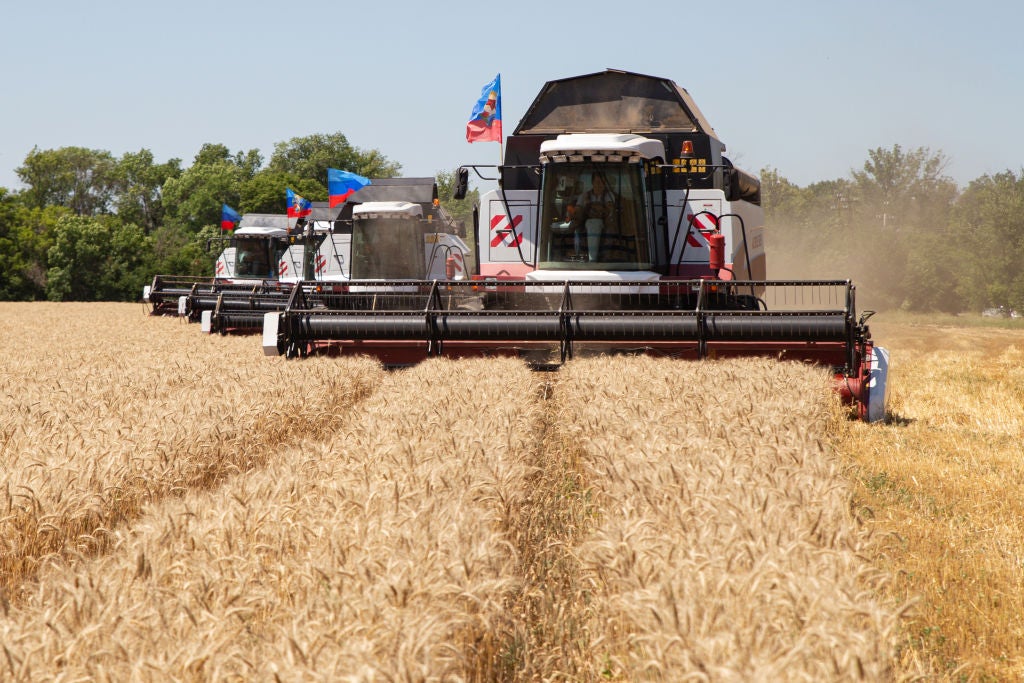Fallout From Russia's Invasion of Ukraine on Food Accessibility and Prices
"Given what has been happening around the world over the last several months with supply chain issues, saying that food price inflation will stem from this conflict is an understatement.""If you think Canada is immune to all of this, given our domestic agriculture production, think again.""Agricultural commodities are traded on world markets. What happens in Ukraine and Russia affects us.""The world, especially the agri-food world, is deeply interconnected."
Professor Sylvain Charlebois, senior director, Agri-Food Analytics Lab., Dalhousie University, Halifax
 |
Oil has been recognized as Russia's big stick. Its lockhold on energy shipments to Europe where many countries are highly dependent on the mercurial decision-making of Vladimir Putin, threatens those countries when he holds back supplies, as he indulges in from time to time. Security of supply for their own domestic market grinds the wheels of industry, heats homes and businesses, and is of vital importance for any country's economy.
The swift and direct result of the current situation with Russia's full-scale invasion of Ukraine has unleashed that insecurity, and it has imposed upon Europe as well as the global community energy destabilization in the steeply rising price of oil. A year ago there was an oversupply of oil, and it was being sold at $35 a gallon. It has now increased to a staggering $100 a gallon -- and rising. Inflation is on its way to a gallop overall, increasing the price of durable product shipments and food.
Under normal circumstances, Russia exports roughly five million barrels of crude daily and about half is piped to Europe. Making it extremely difficult for those countries hugely dependent on Russian oil to follow through on their intentions to punish President Putin for his irredentist inclinations, culminating in invasion with the intention to occupy Ukraine in the sense of installing a puppet government loyal to Russia.
Penalizing Russia's Putin regime comes with unpalatable risks on many levels, in an increasingly interconnected world of finance and trade. While expressing their displeasure with Mr. Putin's imperious move to break Ukraine of its intention to move ever closer to the West, aspiring to join NATO and the European Union, many countries are concerned over the disruption of Russian energy exports. Particularly at a time when the world is slowly recovering from the economic disaster that SARS-CoV-2 wrought globally.
 |
| Ukraine's highly fertile black soil makes it an important country for global wheat supplies. (Photo by Alexander RekaTass via Getty Images) |
Transportation costs for all manner of goods, and most particularly food, will be increasing at an uncomfortable rate. The region under a state of conflict is an exporter of nitrogen, potassium and phosphorus fertilizer. In response to the invasion fertilizer prices were increased by over $200 a ton overnight. Farmers hoping to increase their yields in response to higher prices now are viewing steeper operating costs.
Ukraine, the second largest land mass in Europe, favoured by nature and geography with rich soil, has long been a breadbasket for Europe. Global commodity markets are responding with the onset of the conflict that Russia has brought upon Ukraine. It took no time at all to see wheat and corn futures reaching record-high levels. Canada is a world-class grain producer, the second-largest land mass in the world, after Russia.
Ukraine, the ninth-largest producer of wheat in the world, has a production level marginally smaller than Canada on a yearly basis. It is also the fifth-largest world producer of corn with agriculture representing some 70 percent of the land in the country, reflecting the fact that about 25 percent of black soil reserves is in Ukraine, enjoying exceptional growing conditions. Ukraine and Russia together account for 25 percent of global wheat exports. The region also produces barley and rye in large quantities.
With the invasion, a ban on all commercial vessels has resulted in the inland sea of Azov -- the main connection to the Black Sea, the location of Ukrainian ports -- becoming inaccessible. Ukrainian grain exports are transported mostly by sea, and marine transport logistics have now been severely compromised in the region.
/https://www.thestar.com/content/dam/thestar/opinion/contributors/2022/02/28/how-the-invasion-of-ukraine-will-impact-food-prices-globally/ukraine_port.jpg) |
"Global wheat markets have been tighter this year than usual, and that is because there were reduced harvests,""At the same time, demand has been really strong, so that has made wheat markets really vulnerable to any – even potential – supply shock.""With both Russia and Ukraine being major exporters of wheat, this is only going to add pressure to wheat markets."Erin Collier, economist, trade and markets division, UN’s Food and Agriculture Organization
Labels: Agriculture, Conflict, Exports, Russia, Ukraine, World Grain Impact

0 Comments:
Post a Comment
<< Home